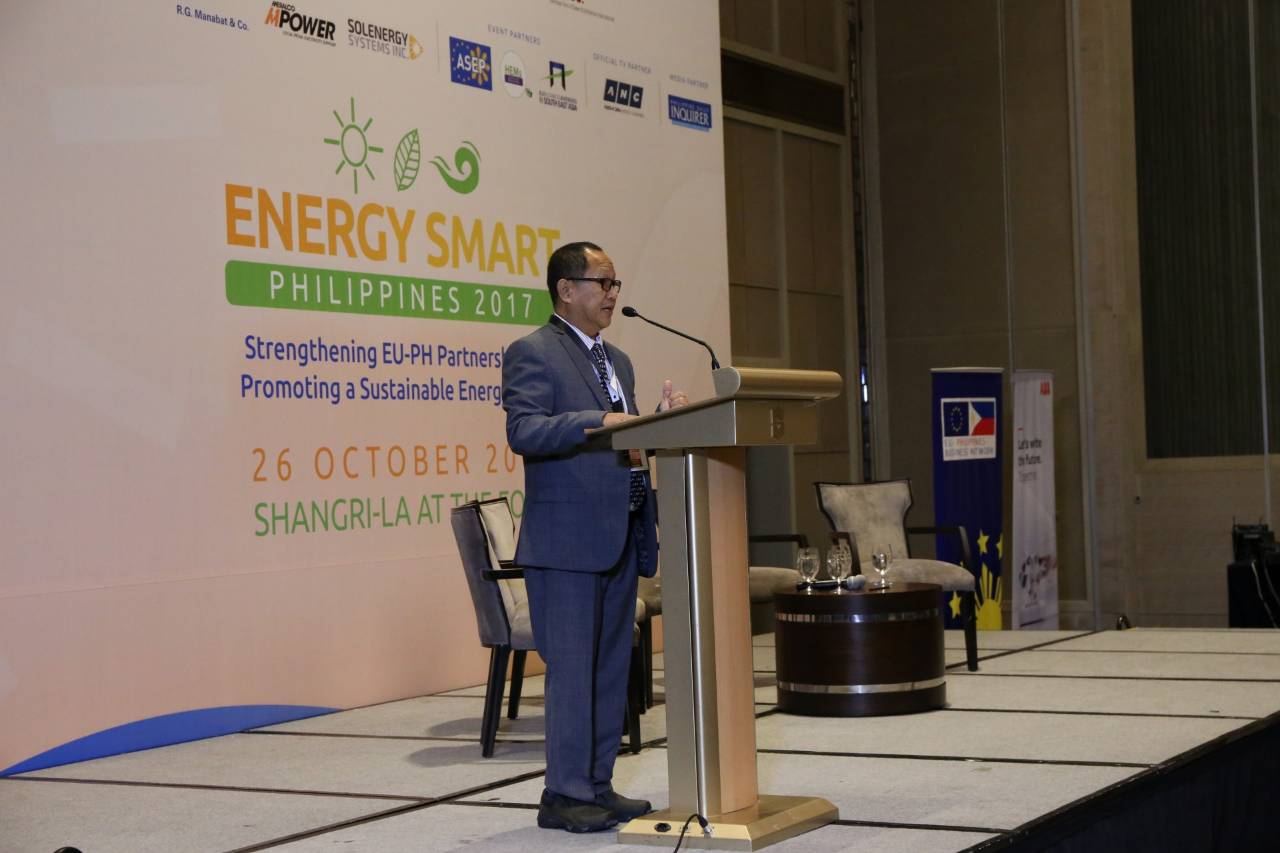
ENERGIZING THE COUNTRY: Representing Energy Secretary Alfonso G. Cusi, DOE Undersecretary Benito L. Ranque stresses the importance of streamlining the processes of energy projects for faster economic growth during the 4th Energy Smart Philippines 2017 held on 26 October 2017 at the Shangri-La The Fort, Taguig City.
(Manila, Philippines). The Department of Energy (DOE) on Thursday vowed to pursue efforts to streamline processing of energy projects and to promote sustainable utilization of energy during the 4th Energy Smart Philippines 2017 held at the Shangri-La The Fort, Taguig City.
Speaking on behalf of Energy Secretary Alfonso G. Cusi, Undersecretary Benito L. Ranque stressed that the DOE is determined to implement Executive Order No. 30, which creates an Energy Investment Coordinating Council (EICC) to facilitate development of priority energy projects.
“EICC is tasked to expedite the processing and release of permits and licenses to a maximum of 30 days for projects declared as Energy Projects of National Significance (EPNS),” Ranque pointed out.
To be classified under EPNS, energy projects must have any of the following attributes: capital investment of at least P3.5 billion; significant contribution to the country’s economic development, significant impact on the environment or involve complex technical processes and engineering designs, and significant infrastructure requirements.
Ranque said the creation of EICC offered great potential for investors in the areas of power development, household electrification, energy efficiency and renewable energy (RE). Among these, Ranque said, RE may be attractive for investors in the energy sector to consider.
“To promote sustainable development in the business of energy, the energy sector’s strategic direction places emphasis on promoting a low carbon future for the country, and the DOE is increasing the share of renewable energy in the country’s installed capacity,” he pointed out.
Based on the RE roadmap, the DOE envisions around 20,000 megawatts of installed RE capacity by 2040. This will be supported with fiscal incentives and implementation of policy mechanisms, such as the Renewable Portfolio Standards, Green Energy Option and Net-Metering, among others.
During the same event, the DOE also reaffirmed its commitment to promote energy efficiency and conservation (EE&C) as a way of life for Filipinos.
DOE Assistant Secretary Leonido J. Pulido III pointed out that energy efficiency must be integrated starting from the resource development down to consumer utilization to ensure a low carbon future.
For his part, OIC for Electric Power Industry Management Bureau, Director Mario C. Marasigan, discussed the current Philippine power outlook, roadmap and off-grid and household energy access efforts of the DOE.
In accordance with DOE’s strategy on sustainable energy initiatives, OIC-Chief for DOE-Energy Efficiency and Conservation Division Artemio Habitan stressed the need for compliance with the minimum energy performance standards (MEPS) for appliances, buildings and facilities.
The 4th Energy Smart Philippines 2017 is organized by the European Chamber of Commerce of the Philippines (ECCP), in partnership with the EU-Philippines Business Network (EPBN), co-funded by the European Union and co-presented by ABB.
The DOE and European Union are collaborating on the Access to Sustainable Energy Program (ASEP), which aims to help achieve the Philippine government’s goal towards electrification and Energy Efficiency and Conservation (EE&C).
The Shangri-la event was meant to support continuing efforts in building a sustainable energy future by providing an avenue for stakeholders to share knowledge and network with players in the energy industry.
###
